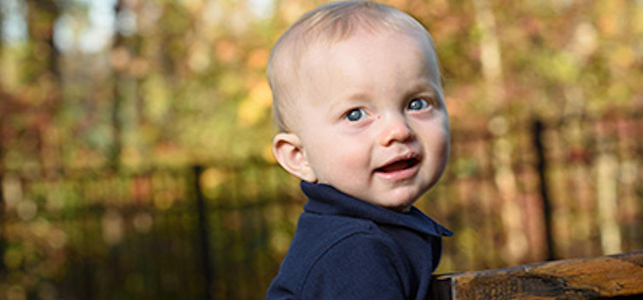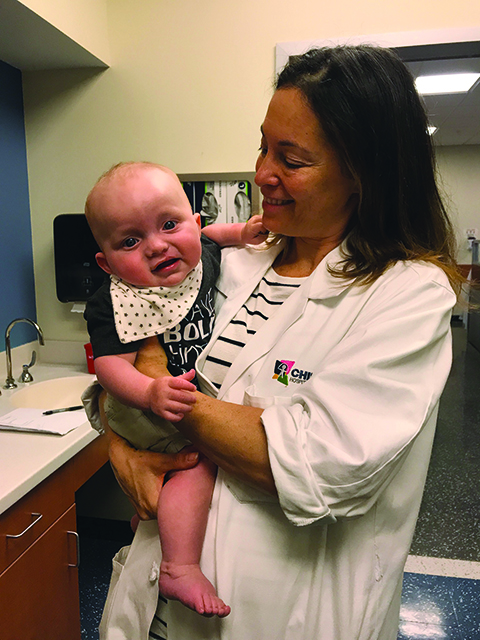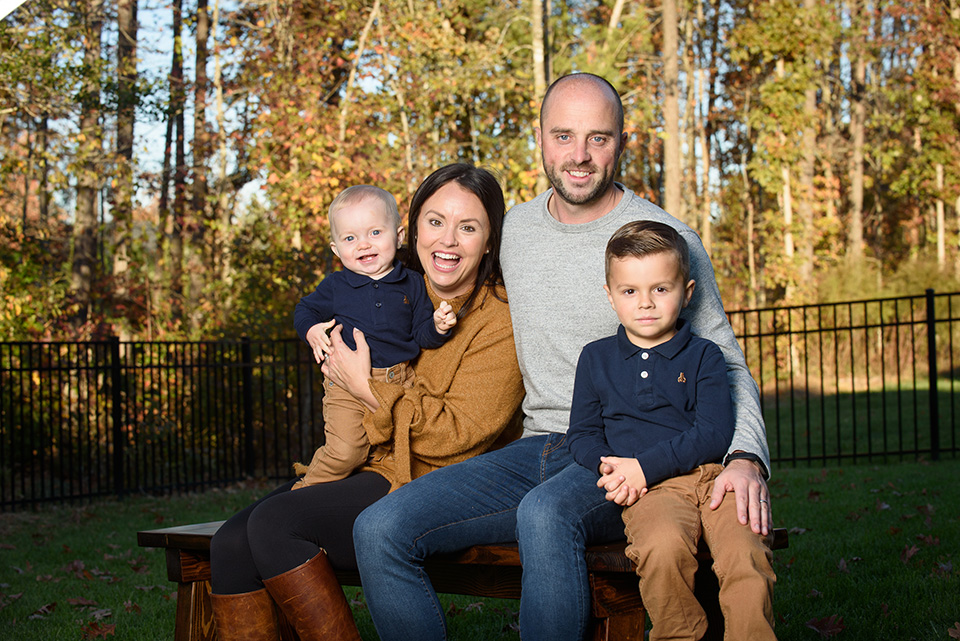
Ten-month-old Leo MacKenzie wanted his mom. His blue eyes pleaded for her even when his dad tried to distract him by carrying him to another room. Awoken early from his afternoon nap, Leo wasn’t interested in being held or his dad’s attention. He wanted to be with his mom and crawl around the family’s Chesterfield County home. While his parents, Amy and Ross, watched Leo and his four-year-old brother, Jack, that afternoon, the MacKenzies shared their experiences at Children’s Hospital of Richmond at VCU and the care Leo will receive into his young adult years.
When Amy was 20 weeks pregnant, an ultrasound revealed Leo had cleft lip and possible cleft palate, which is more difficult to detect during pregnancy. With no family history and not knowing anything about her son’s diagnosis, Amy began doing research, which led her to Dr. Jennifer Rhodes, medical director of CHoR’s Center for Craniofacial Care.
One of the most common birth differences in the United States, cleft lip and cleft palate affects about one in every 600 babies born each year. It occurs when parts of the lip and mouth do not fuse correctly before birth, causing an opening in the lip and roof of the mouth. The Center for Craniofacial Care specializes in treating children with cleft lip and cleft palate, craniofacial conditions, and vascular malformations and birthmarks. The multidisciplinary team includes Dr. Rhodes, a craniofacial and pediatric plastic surgeon, Ruth Trivelpiece, the program’s coordinator, and more than 15 different specialists in areas including audiology, dentistry, genetics, neurosurgery, orthodontics, otolaryngology, psychology, speech/language pathology and more.
Because clefts can affect everything from feeding, hearing and speech to facial shape, teeth development and self-esteem, the craniofacial team follows children into young adulthood, seeing them every six months until age six and annually after that. Children are able to see all the specialists they need during the same visit, making it easier for families and allowing more coordinated care among team members.
Meeting the team
“I was a hormonal pregnant mom, and I was scared,” Amy recalled of her first call with Ruth. “I instantly felt a connection and warmth from our 25-minute conversation.”

When she was 23 weeks pregnant, Amy and Ross had their first in-person meeting with Dr. Rhodes and Ruth. During the two-hour visit, the couple learned what to expect once Leo was born and how Dr. Rhodes, Ruth and the craniofacial team would help their family.
“Amy came in with lots of questions,” Ruth recalled of the MacKenzie’s prenatal consultation. “The most pressing question for families is usually how they are going to feed their baby so we use life-size dolls and bottles to provide hands-on practice and help parents understand feeding options.”
Although a cleft lip does not usually affect feeding, babies may need to eat in different positions and may swallow more air, making it necessary to burp them more often. Cleft palate causes more feeding difficulties because the opening between the mouth and nose does not allow a baby to generate enough suction to get adequate milk. Ruth, who keeps a bag with newborn feeding supplies packed at all times, visits with parents soon after a child’s birth to ensure the baby is getting proper nutrition and the family is getting the support they need. On December 10, 2018, Leo was born with a unilateral cleft lip and cleft palate, which affects the shape of the lip and nose, at a local community hospital. Ruth and Dr. Rhodes were there the same day.
A new smile
During the next six weeks, Amy monitored Leo’s weight to ensure he was growing and ready for surgery to repair his lip, which is recommended within the first three months after birth. Leo’s surgery was scheduled for February 6, 2019 at the Children’s Pavilion.
“This was by far one of the hardest experiences [Ross] and I had gone through since becoming parents,” Amy remembered. “To us, Leo was perfect, and we fell in love with his smile. The thought of sending your eight-week-old baby in for a major surgical procedure is hard enough but one that is going to change his sweet face forever was harder to manage.”

Throughout the three-hour procedure, the MacKenzies received regular updates from operating room nurses and were thrilled to talk to Dr. Rhodes and see Leo after surgery. Amy remembered being “overcome with emotion” when she saw Leo, whose smile looked great even after undergoing surgery.
Leo drank from a bottle soon after surgery and hasn’t found a food he doesn’t like since he started eating pureed foods when he was six months old. Amy described Leo as a happy baby who loves being tickled and tossed in the air by Ross. He also enjoys when Amy and Jack read and sing “The Wheels on the Bus,” a book Leo received from CHoR’s book cart during an early visit to the hospital.
.jpg)
Four Miles for Kids
As a way to give back to the hospital that has helped their family, Amy and Ross organized a team of family and friends to participate in Four Miles for Kids, a family-friendly race on and around CHoR’s Brook Road Campus in September. The MacKenzie’s team, Leo’s Smile, had 22 members and was the second place fundraising team, collecting $2,961 for CHoR.
“The stigma with clefts is that they are cosmetic,” Amy said of her quest to raise awareness of cleft lip and cleft palate. “We want this to be an annual event our family participates in. As Leo gets older it will demonstrate to him how to return the favor to the organization that has helped him along the way.”
As the MacKenzies prepared for Leo’s cleft palate surgery in mid-November, they were encouraged that this early treatment would help Leo as he begins to form words like “dada” that rely on having a closed palate. Ruth said the timing of this surgery is important because scheduling it too early can affect mid-facial growth and too late can impact speech. If a child needs additional surgeries like ear tubes or procedures that require anesthesia, Ruth said the team coordinates treatment to occur at the same time.
As Leo grows, he may need additional surgeries such as bone graft surgery to support dental and orthodontic issues. Dr. Rhodes said the team’s goal is for children to “look, feel and function as best as possible when they start kindergarten” and to “address issues early so problems don’t become bigger problems.”
As Amy and Ross watched their sons playing this fall, they continued to praise their experiences at the hospital.
“I can honestly say I don’t know where we would be without CHoR,” said Amy. “We are beyond grateful for all CHoR has done and continues to do for Leo and our family. When you have a child who needs a variety of treatment plans, it’s reassuring that the facility you are in is equipped to meet all of their needs.”
